Understanding Kidney Stone Cat Food: A Comprehensive Guide


Intro
Kidney stones in cats are a serious concern for pet owners. The formation of these stones can lead to painful urinary issues and significant health challenges. Thus, understanding the dietary needs of cats prone to this condition is crucial. This guide explores various facets of kidney stone cat food, including its key ingredients, benefits, and essential tips for maintaining urinary health in felines.
Understanding Your Pet
Breed Traits
Some cat breeds are genetically predisposed to developing urinary stones. For instance, breeds like the Burmese, Persian, and Maine Coon may face higher risks. Understanding breed-specific traits can aid in tailoring diets that meet their unique needs. Protein sources and other ingredients may need to be adjusted based on the individual cat's breed and predisposition.
Common Temperaments
Felines exhibit diverse temperaments that can influence dietary habits. A more anxious cat might not eat as regularly, while a social cat may be more inclined to share food, affecting how much they consume. Owners should observe their cat's eating behaviors to better identify any potential health issues.
Special Needs
Cats with a history of kidney stones require special dietary considerations. High-quality cat food designed specifically for those prone to urinary issues often includes ingredients such as controlled mineral levels, specific pH balance, and increased moisture content to facilitate urinary health. It is vital for owners to consult with a veterinarian for tailored diet recommendations.
Pet Care Essentials
Nutrition and Feeding Guidelines
A well-balanced diet is paramount for cats that may suffer from kidney stones. Here are important aspects to consider:
- Low Magnesium Content: Excess magnesium can contribute to stone formation.
- Increased Moisture Levels: Wet food can help increase hydration, vital for urinary health.
- Balanced Minerals: A careful balance of calcium, phosphorus, and other minerals is essential.
Owners should look for brands like Hill's Prescription Diet or Royal Canin Urinary SO, as they cater specifically to this condition.
Grooming Tips and Techniques
Regular grooming not only helps in reducing shedding but also aids in monitoring the cat's overall health. Check for any lumps or changes in body condition during grooming sessions.
Health and Wellness
Maintaining regular veterinary check-ups is critical for keeping track of your cat's urinary health. Provide ample hydration through fresh water and entice them to drink more by offering ice cubes or water fountains.
Training and Behavior
Basic Training Techniques
Training cats can sometimes feel challenging. Employing consistent commands and positive reinforcement encourages good eating habits and behavior during mealtimes.
Behavioral Problems and Solutions
If a cat suddenly refuses to eat or shows signs of distress, it may be time to reassess their diet or consult a vet. Observing changes in eating habits can offer early signs of potential health issues.
Mental Stimulation Activities
Encourage mental enrichment through puzzle feeders and interactive toys. This can enhance their interest in food and reduce anxiety, promoting a healthier appetite.
Engaging with Your Pet
Interactive Games and Toys
Using engaging toys can help mitigate behavior issues that cats may develop due to boredom. Stimulate their senses with toys that mimic prey or involve problem-solving elements.
Safe Outdoor Activities
For those inclined, outdoor adventures in a controlled space can provide beneficial physical and mental exercise. Ensure safety by using leashes and harnesses.
Family-Friendly Pet Interactions
Educate family members on how to appropriately interact with your cat. Gentle handling and respecting a cat's space can foster a trusting environment, facilitating better eating habits.
Pet Adoption and Integration
Choosing the Right Pet for Your Lifestyle
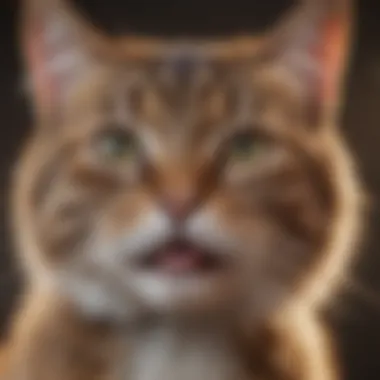

Match the cat's temperament and needs with your lifestyle. Consider factors like activity level and grooming requirements.
Preparing Your Home for a New Pet
Set up a specific area with food, water, and a litter box before bringing a cat home. This can help ease the transition into the new environment.
Tips for Smooth Intro
Introduce new pets gradually. Supervising initial interactions can minimize stress and avoid territorial disputes.
Summary
This comprehensive guide serves to equip pet owners with knowledge about kidney stone cat food. By understanding the unique needs of your feline, integrating proper care, and fostering a supportive environment, you can greatly enhance the quality of your cat's life. Regular consultations with a veterinarian and conscious dietary choices are essential in preventing kidney stones and ensuring overall well-being. The importance of hydration, balanced nutrition, and behavioral considerations cannot be overstated.
Prelude to Kidney Stones in Cats
The issue of kidney stones in cats is not just a veterinary concern but also a topic of significant impact for pet owners. Understanding kidney stones is essential for ensuring the well-being of your feline companions. Pet owners who grasp the basics of kidney stones can better manage their cat's health. This knowledge aids in dietary decisions, recognizing symptoms, and scheduling necessary veterinary consultations.
The formation of kidney stones can lead to discomfort and serious health issues in cats. If untreated, these stones can obstruct the urinary tract, causing pain, infections, or more severe complications. Therefore, early recognition and intervention are crucial.
Overview of Kidney Stones
Kidney stones, also known as uroliths, are solid debris formed from minerals and substances in the urine. They can vary in size, location, and composition. The formation of these stones can happen due to several factors, including diet, hydration levels, and genetic predispositions. Cats with limited access to water or who primarily eat dry food may be at higher risk for developing kidney stones.
The composition of kidney stones can be diverse. Common substances include struvite, calcium oxalate, and urate. Each type has distinct causes and implications for treatment. By understanding these stones, pet owners can take preventative measures and choose appropriate diets to minimize the risk.
Common Types of Kidney Stones in Cats
The classification of kidney stones is notably pivotal for devising a treatment plan. Common types of kidney stones in cats include:
- Struvite Stones: Often associated with urinary tract infections, these stones are typically composed of magnesium, ammonium, and phosphate. They are more prevalent in female cats and can sometimes be dissolved with proper diet.
- Calcium Oxalate Stones: These stones are formed from calcium and oxalate. They are typically more difficult to treat as they cannot be dissolved and often require surgical intervention. Male cats seem to be at higher risk.
- Urate Stones: These stones arise from purine metabolism, particularly in certain breeds, such as Dalmatians and Bulldogs. They are generally rare but can pose significant health risks if they form.
Symptoms of Kidney Stones
Recognizing the symptoms of kidney stones is critical for timely treatment. Common signs include:
- Frequent urination or difficulty passing urine
- Blood in the urine, which may appear as a pink or red discoloration
- Signs of pain, such as yowling or straining in the litter box
- Lethargy or decreased appetite
- Vomiting, which can indicate a serious condition
Early intervention can significantly improve outcomes. Observing changes in a cat's behavior or urinary habits can be the first step in seeking veterinary assistance.
By understanding these symptoms, pet owners can ensure that they seek care as soon as health issues arise, thus helping to implement crucial dietary changes sooner.
Dietary Management of Kidney Stones in Cats
Dietary management plays a pivotal role in the health of cats suffering from kidney stones. This approach to diet is tailored to limit the formation of new stones and manage the existing ones. A well-planned diet not only supports overall health but also addresses urinary issues directly related to kidney stones.
A proper diet focuses on balancing nutrients and controlling specific substances in their food. This balance can significantly reduce the risk of future stones forming. The prevention of stones through diet is often preferable than invasive treatments. Getting this right can also lead to fewer veterinary visits, saving time and costs.
The Importance of Diet
The right diet can influence urine composition in a cat, which is crucial for preventing kidney stones. A high-quality diet helps to dilute urine, making it less concentrated and less likely for minerals to crystallize into stones.
Additionally, a diet that is lower in certain minerals can help manage the types of stones that a cat may develop. For instance, a diet lower in calcium and oxalate can be beneficial for cats predisposed to calcium oxalate stones. Furthermore, a focus on wet food increases moisture intake, which is essential for urinary health.
General Nutritional Considerations
When constructing a diet for cats with kidney stones, owners should consider:
- Quality Protein: It is important to select high-quality protein sources that are easier for kidneys to process.
- Healthy Fats: Essential fats and oils aid in overall health, making sure that cats receive necessary fatty acids.
- Carbohydrates and Fiber: Moderate amounts of carbohydrates should be included, with fiber promoting healthy digestion.
- Vitamins and Minerals: A complete array of vitamins and minerals supports immunity and general well-being.
By ensuring balanced nutrition that meets these criteria, pet owners can help their cats lead healthier lives.
Avoiding Offending Ingredients
Certain ingredients can exacerbate kidney stone issues. It is crucial to avoid foods that are high in the nutrients that lead to stone formation in susceptible cats. These include:
- Excessive Protein: High-protein diets can lead to concentrated urine.
- Certain Grains: Some grains may contain high levels of oxalates, which can contribute to stone formation.
- Sugars and Artificial Additives: High sugar levels can disrupt the natural balance in the body.
Avoiding these offending ingredients does not mean compromising on taste or nutrition. Premium brands often formulate their recipes with the right balance, ensuring safety for cats with a history of kidney stones.
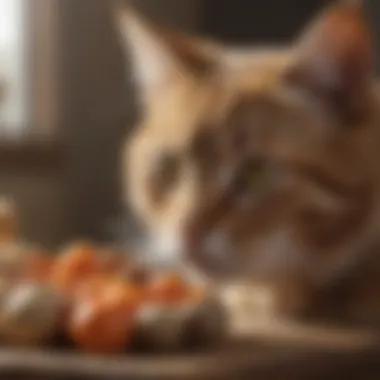
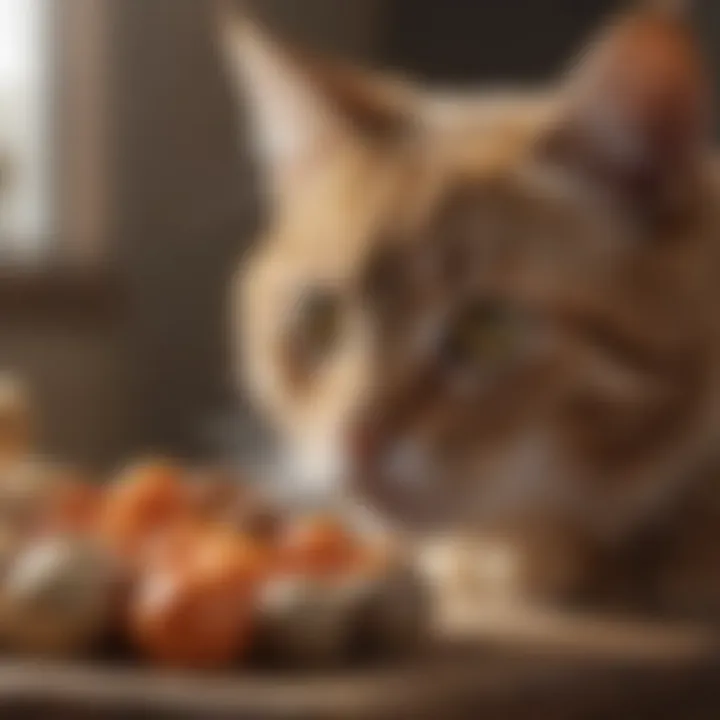
Key Ingredients in Kidney Stone Cat Food
The selection of ingredients in kidney stone cat food plays a crucial role in managing urinary health in felines. Understanding what goes into these diets can help pet owners make informative choices for their cats. Each component contributes uniquely to preventing the formation of stones and promoting overall well-being. This section will examine key ingredients that are beneficial for cats prone to kidney stones.
High-Quality Proteins
Proteins are vital for maintaining muscle mass and overall health in cats. High-quality proteins—the ones derived from meat sources like chicken, turkey, or fish—are essential for cats with kidney stones. A diet rich in quality proteins helps ensure that the cat receives adequate amino acids necessary for bodily functions. Opting for identifiable sources of protein can lead to better digestion and absorption, which is important for a cat's urinary health. Some pet owners might consider protein content when choosing food but should look for products with low levels of certain amino acids that could lead to stone formation, such as purines.
Essential Fats and Oils
Fats are another necessary element of a balanced diet. They provide concentrated energy and support healthy skin and coat. Essential fatty acids, such as Omega-3 and Omega-6, help reduce inflammation and play a role in urinary tract function. Pet owners should seek cat food that includes sources like fish oil or flaxseed oil. Keeping fat levels moderate is helpful. High-fat diets may lead to obesity, which can worsen underlying health concerns. Therefore, understanding the source and proportion of fats in the food can be crucial for a kidney stone management diet.
Carbohydrates and Fiber
Carbohydrates are often seen as fillers in cat food, but they serve an important purpose. They provide energy and can aid in maintaining a healthy weight. Fiber, in particular, is beneficial as it promotes healthy digestion and can help manage the urinary pH balance. Foods rich in fiber can potentially trap minerals that contribute to crystal formation in the urinary tract. When selecting cat food, look for those that include whole grains or vegetables. Be cautious, though, as not all carbohydrates are equal; some may lead to excessive weight gain if not balanced appropriately in the diet.
Vitamins and Minerals
Vitamins and minerals are essential for a healthy cat. They play various roles, from supporting immune function to aiding in the metabolism of other nutrients. Specialized diets often contain added vitamins and minerals that specifically help prevent kidney stones. For example, ensuring a balanced Calcium-to-Phosphorus ratio is critical, as too much of either can lead to stone issues. Additionally, some vitamins can assist in maintaining proper urinary tract function. Always consider consulting with a veterinarian to find cat food that contains the right balance of necessary vitamins and minerals for your specific feline's needs.
Types of Commercial Kidney Stone Cat Food
Selecting the right cat food is essential for managing kidney stones. Knowing the types of commercial foods available helps to tailor a cat's diet effectively. Here, we will discuss two broad categories: prescription diets and over-the-counter options. Each has distinct benefits and considerations.
Prescription Diets
Prescription diets are specially formulated cat foods designed to address specific health issues, including kidney stones. Vets often recommend these diets for cats diagnosed with urinary problems. These foods offer several advantages:
- Targeted Nutritional Formulation: They contain the necessary nutrients to dissolve certain types of stones and prevent new formations.
- Controlled Mineral Levels: These diets often have reduced levels of minerals like calcium, phosphorus, and magnesium. Lower amounts can minimize the risk of crystal formation.
- Preventing Recurrences: Cats with a history of urinary stones might benefit from these diets. They reduce the possibility of future occurrences through controlled composition.
One popular prescription diet is Hill's Prescription Diet c/d Multicare. This food is designed to promote urinary tract health and maintain an optimal pH.
Over-the-Counter Options
Over-the-counter cat food provides choices for pet owners looking for more accessible options. Although not as specialized as prescription diets, some over-the-counter foods may still support urinary health:
- Quality Ingredients: Look for brands that emphasize high-quality proteins and essential nutrients. Ingredients that support hydration are critical.
- Formulated for Urinary Health: Some standard commercial brands, like Royal Canin Urinary SO, provide formulations that can help maintain urinary tract health.
- Flexibility: These diets are more readily available and can be incorporated without a prescription.
While these options may not be as targeted, they can still offer a beneficial feeding strategy, especially for cats without severe health issues.
"When managing kidney stones in cats, diet options play a significant role. Choose between prescription diets for serious cases or over-the-counter options for general maintenance."
In summary, understanding the types of commercial kidney stone cat food can lead to more informed dietary choices. These choices are crucial for ensuring your feline's health and well-being.
Homemade Diet for Cats with Kidney Stones
Homemade diets for cats with kidney stones represent a crucial approach to managing feline urinary health. Many pet owners are drawn to home-prepared food as they wish to have better control over their cat's nutrition. It allows the owner to use fresh ingredients, which can provide more balanced nutrition compared to some commercial options. However, preparing homemade meals must be done thoughtfully and with awareness of your cat's specific needs, especially in cases where kidney stones are present.
One of the most significant elements of a homemade diet is the ability to tailor it to address specific nutritional requirements. Certain ingredients can alleviate the risk of stone formation or even assist in dissolving existing stones. For instance, providing an adequate amount of moisture in the diet can help dilute urine, reducing the concentration of minerals that could otherwise lead to stones. This makes hydration a central part of a homemade diet for cats with kidney stones.
Additionally, a well-planned homemade diet can avoid common triggers for kidney stones found in many commercial foods. Ingredients high in oxalates, such as spinach and beets, may not be ideal for cats prone to certain types of stones. Instead, focusing on alternative ingredients like lean proteins, low-oxalate vegetables, and specific carbohydrates can create a more suitable meal.
"Crafting a homemade diet necessitates attention to balance, ensuring all essential nutrients are present while avoiding ingredients that could lead to complications."
Wether purchasing from a local market or growing it at home, fresher ingredients are often more nutritious and tastier for cats. This can increase their appetite, encouraging more food intake which is essential for hydration and health. Yet, it is essential to remember that not all human foods are safe for cats. Careful research and planning are needed to create a safe and nourishing diet.
Making Balanced Meals
Creating a balanced meal for a cat suffering from kidney stones involves understanding their dietary needs. The balance includes proteins, fats, and the right types of carbohydrates. High-quality proteins are fundamental as they support overall health and help maintain muscle while preventing malnutrition.
Sometimes a simple recipe may suffice but integrating a variety of ingredients keeps meals interesting. For example:
- Protein sources: Cooked chicken, turkey, or fish.
- Carbohydrates: Steamed zucchini, sweet potatoes, or rice in moderation.
- Fats: Omega fatty acids from fish oil or flaxseed oil can be beneficial as well.
Always include water or low-sodium chicken broth to enhance moisture content. This will help promote hydration, essential for a cat's kidney health.
Tips for Preparing Meals:
- Avoid using excessive salt or added sugars.
- Gradually introduce any new ingredients to monitor for negative reactions.
- Mix ingredients properly to avoid choking hazards.
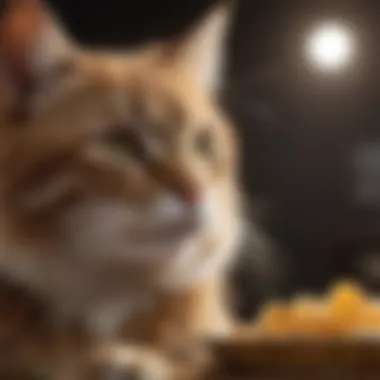
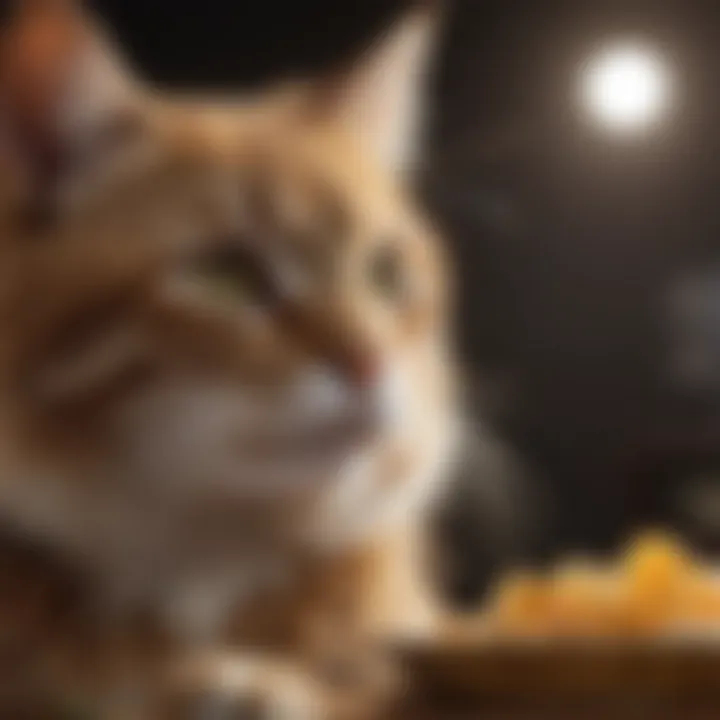
Consulting a Veterinarian
Before embarking on a homemade diet for your cat, consulting with a veterinarian is crucial. They can evaluate your cat’s unique health scenario and recommend a tailored meal plan. Since kidney stones can vary in composition, your vet will guide you in selecting the right foods and supplements.
Regular veterinary consultations ensure adjustments can be made to the diet. This is particularly important due to the changing dietary needs that can arise from underlying health issues or as the cat ages. A vet can also perform necessary tests to monitor stone formation, urine pH levels, and overall kidney function.
Additionally, some ingredients may need veterinary oversight to ensure they do not affect your cat's existing health issues negatively. Interaction with other medications or underlying conditions may also necessitate adjusting the diet.
Hydration: A Critical Component
Maintaining proper hydration is a fundamental aspect of managing kidney stones in cats. Water is critical not only for overall health but specifically for the dilution of minerals that can cause the formation of stones in the urinary tract. Insufficient water intake may lead to concentrated urine, which can exacerbate the conditions favoring stone formation. Therefore, ensuring that your cat receives adequate hydration is pivotal in preventing kidney stones from developing or worsening in existing conditions.
Understanding Water Intake
Water intake varies greatly among cats based on several factors. These factors include age, activity level, diet, and overall health. Cats that consume dry food naturally have a lower water intake compared to those who eat wet or canned food, since wet food contains a significant amount of moisture. On average, an adult cat should drink about 60-70 milliliters of water per kilogram of body weight per day.
To facilitate better hydration, pet owners should monitor their cat's water bowl regularly to ensure it is clean and filled with fresh water. Additionally, interest in water can be encouraged by using a pet water fountain, which provides moving water that many cats find more appealing.
Encouraging Hydration
Promoting hydration in cats does not just rely on having a water bowl available. Here are several tips that can help increase your cat's water intake:
- Incorporating Wet Food: Feeding your cat high-quality wet food can significantly boost their moisture intake.
- Flavored Water: Some cats are more inclined to drink when the water has added flavor. Consider a small amount of low-sodium broth to encourage drinking.
- Water Fountains: Using a water fountain can intrigue your cat and encourage them to drink more, as they may be attracted to the movement.
- Regular Bowl Cleaning: Cats are particular about cleanliness. Regularly cleaning the water bowl can encourage drinking.
"Ensuring adequate hydration is one of the simplest yet most effective ways to prevent kidney stones in cats."
- Adding Ice Cubes: In warmer weather, ice cubes in the water bowl might entice your cat to drink more as they bat at them.
- Multiple Water Stations: Place several water bowls around the house to encourage drinking as your cat roams from room to room.
- Routine Monitoring: Keep an eye on changes in your cat's drinking habits. If you notice a sudden decline, consult your veterinarian as this might be an indication of health issues.
Overall, focusing on hydration is vital for combating kidney stones in feline pets. These steps not only help ensure that your cat is drinking enough but can also aid in their overall well-being.
Monitoring and Follow-Up Care
Monitoring and follow-up care represent crucial components in the management of kidney stones in cats. Regular assessments help pet owners ensure that dietary measures are effectively preventing further stone formation. It is vital to establish a system to monitor the overall health of cats, particularly when dietary adjustments are made. The interplay between diet, hydration, and medical oversight can lead to improved outcomes for cats experiencing urinary health issues.
Regular Veterinary Check-Ups
Frequent veterinary check-ups play an instrumental role in maintaining the health of cats prone to kidney stones. Veterinarians can perform routine urinalysis and blood tests to evaluate kidney function and detect any early signs of complications. These check-ups also provide an opportunity to adjust dietary plans based on the cat's individual needs and response to treatment.
By scheduling regular appointments, pet owners can work closely with veterinarians to monitor the presence of crystals or stones. In some cases, the veterinarian may recommend imaging techniques to visualize renal structures and assess overall health. Cats require ongoing assessment, which ensures timely intervention if issues arise.
Behavioral Observations
In addition to regular veterinary visits, behavioral observations can offer insights into a cat's health status. Cats may exhibit subtle changes in their behavior when unwell. For example, increased urination, changes in drinking habits, or alterations in appetite might signal potential urinary problems.
Being attentive to these behavioral changes can greatly assist in timely diagnosis and treatment. Developing a routine for assessing your cat’s behavior allows pet owners to track any patterns or significant shifts. This monitoring can act as an early warning system, prompting veterinary consultations if issues are noted.
- Features to observe include:
- Litter box habits: Frequency and consistency of urination and defecation.
- Dietary preferences: Any reluctance to eat certain foods.
- Energy levels: Signs of lethargy or hyperactivity.
- Drinking behavior: Changes in water intake, indicating potential dehydration.
"Owner vigilance greatly enhances the likelihood of maintaining feline health. Regular monitoring combines professional care with attentive management at home."
Ultimately, thorough and continuous monitoring ensures that the dietary strategies put in place for managing kidney stones remain effective, safeguarding the health of your feline companion.
Finale
Understanding kidney stone cat food is critical for maintaining the well-being of felines susceptible to urinary issues. Proper diet plays a pivotal role in managing and preventing the recurrence of kidney stones, which can have severe implications for a cat's health. The choice of cat food influences hydration levels, nutrient absorption, and overall urinary tract function.
Recap of Dietary Importance
A balanced diet is essential in preventing kidney stones. Ingredients chosen for cat food can significantly affect stone formation. High-quality proteins, specific fats, and careful carbohydrate selection can aid in managing urine pH levels and minimizing crystal buildup. Therefore, pet owners should prioritize foods enriched with these beneficial components.
- High-Quality Proteins: Opt for foods that contain real meat, which provide crucial amino acids.
- Essential Fats: Include healthy fats to ensure fat-soluble vitamins are well-absorbed.
- Controlled Carbohydrates and Fiber: Adjust carbohydrate intake to regulate weight and promote digestive health.
- Vitamins and Minerals: Key vitamins such as A, E, and various B vitamins should be included to support overall health.
In summary, focusing on dietary specifics can have a direct impact on urinary health and well-being.
Final Recommendations
For considering a cat's diet, consulting with a veterinarian is highly advised. They can offer tailored recommendations based on your cat's individual health needs, age, and lifestyle. Additionally, investing in high-quality, prescription-grade cat food might be beneficial, as these products are specifically formulated to prevent kidney stone formation.
Furthermore, encourage regular hydration by providing fresh water daily. Consider incorporating wet food as it contains more moisture than dry kibble, thus assisting in overall hydration and urinary health.
"Regular veterinary check-ups, balanced diets, and continuous observation are key to preventing kidney stones in cats."
Ultimately, pet owners must be proactive in managing their feline's dietary needs to mitigate health risks. By being informed and making thoughtful choices, you can help your cat lead a healthier life.



